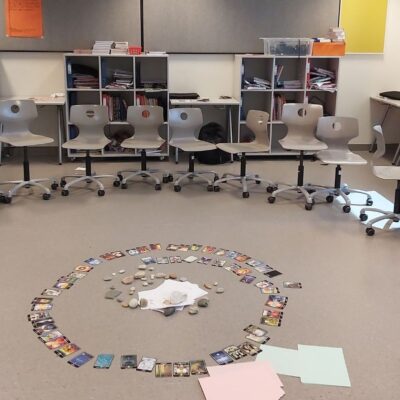
One of the things I love about the Genuine Contact approach is that we work with simple frameworks and processes to address complex problems, we use the tools over and over and can apply them in many ways. One of the things that can make me very nervous about Genuine Contact is that we work with simple frameworks and processes to address complex problems, we use the tools over and over and can apply them in many ways.
The Paradox of Working with Simple Processes
Yes, one of the things I love the most about working with Genuine Contact is also one of the things that can cause fear in me as I circle back repeating a simple process or tool with the same group. I’ve been thinking about this because recently one of my clients brought up his hesitancy to about using a simple process he’d used once before in a different context. He was afraid that because some people were the same, repeating it would be boring for them and therefore wouldn’t yield the effect he had hoped.
I recognized his discomfort even as I encouraged him to go ahead and repeat the process, and that it would yield new results. I told him, he may be surprised because it could work even be better than before since now some people know how to do it. And it did.
His willingness to voice this discomfort has given me the opportunity to reflect on the wisdom that is present in following simple processes and repeating them again…and again….and again.
In this case, the simple process we were discussing was about asking people to write down and share their Hopes and Fears for a meeting at the start and staying aware of how their hopes and fears can be realized during the meeting.
I use this process at the beginning of every meeting — or in the case of processes that include many meetings, at the first meeting of the process. I have done this innumerable times, often with the same people. Over and over and over, we come back to this simple tool to help us acknowledge all those elements that we are bringing with us into the room and to make us aware of where we can take responsibility for our own learning as both an individual and as a group.
Newness vs Experience
When my client mentioned his discomfort about doing something he had done before, it reminded me of an area that seems out of balance in modern organizational life. It is the disparity between the amount of emphasis and value we place on newness versus the acquisition of experience. We learn one process and then go to the next, and then the next. A bit like the throwaway consumer culture in which we live. The “been there, done that” attitude that permeates much of our culture.
Don’t get me wrong, I see the value of incorporating the new and of having different and new experiences. At the same time, by focusing so much on the new we miss another aspect of value in working together; the value that is gained by acquiring depth in understanding and skill through repetition and re-visitation. What I have noticed by repeated use of such simple things as stating of Hopes and Fears at the beginning of meetings, is that it builds so many muscles for working together. This is done by repeated use not by continually trying something new.
For me, this is about the difference between two important, connected but different forms of learning. The first is conceptualizing, that is the skill to be able to think about, analyze and put thoughts into a frame. The conceptualizing mind loves looking for new ways to understand what is happening, to figure out yet another aspect of what takes place. It thrives on novelty, on perfecting its picture of something by ever-expanding explanations as new information is gathered. It’s the form of knowing that we favor in our current world. It is important and certainly a great part of the puzzle of understanding.
The other part is what I am choosing to call craft. The craft of learning how to do something is in the practice, in the repeated building of muscles for a certain sort of outcome. Craft is not only in the mind. Craft is within the whole system, the body, the emotions, the intuition, and the mind. It is about developing a connected experience and an intimate relationship with what you are doing within your entire being. Craft is honed through repetition, especially when this repetition takes place mindfully in different contexts. Through it, you find new depths of understanding at each moment. You learn that with tiny, sometimes almost imperceptible adjustments or changes you can create a world of difference.
For me, the repetition of the simple Genuine Contact tools, like Hopes and Fears is like learning a craft. In this case, it’s the craft of learning to be present and take ownership of your individual and collective learning. When you have dominated a craft you also learn that by going back to the basics over and over again you always find something new. For me, Genuine Contact’s simple frameworks and processes are about this same thing, developing a deep relationship with what you are engaged in.
So even though I also sometimes get nervous as I again do something I have done before with the same people, I still do it. I take a deep breath and dive in. And after 10 years of working this way, just as I was encouraging my client, whenever I walk into a group to begin a meeting or process there is the step where I ask people to go into groups, discuss their hopes and fears about this meeting and put them on a flip chart…and each time for upwards of 10 years now, I am humbled by the way this simple process helps people to fully engage in the work at hand.









Elisabeth Tepper
Dear Doris,
I loved your article and all of a sudden what came to my mind is that I never get bored of having a cup of coffee every morning, which helps me get ready for my day.
I can’t imagine wanting to have a different cup of something else every day.
Thank you for the reflection!!!
Doris Gottlieb
Dear Elisabeth,
Thanks for your comment and also for your reflection. Indeed there are those things that through repetition become part of our system and deepen our experience. I love the morning cup of coffee as a metaphor 🙂